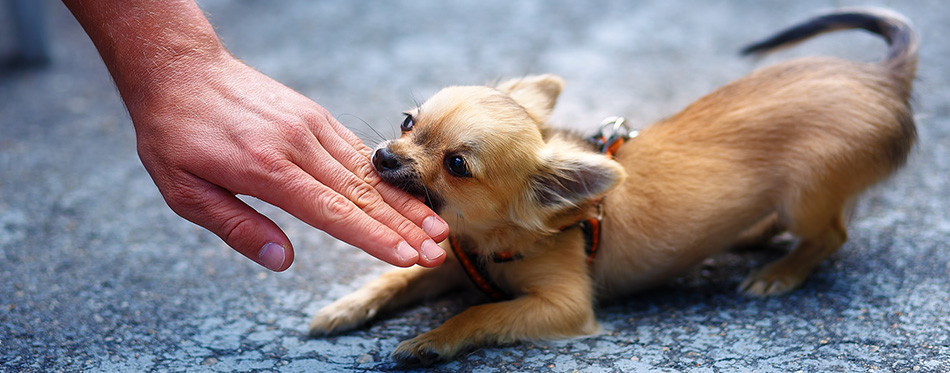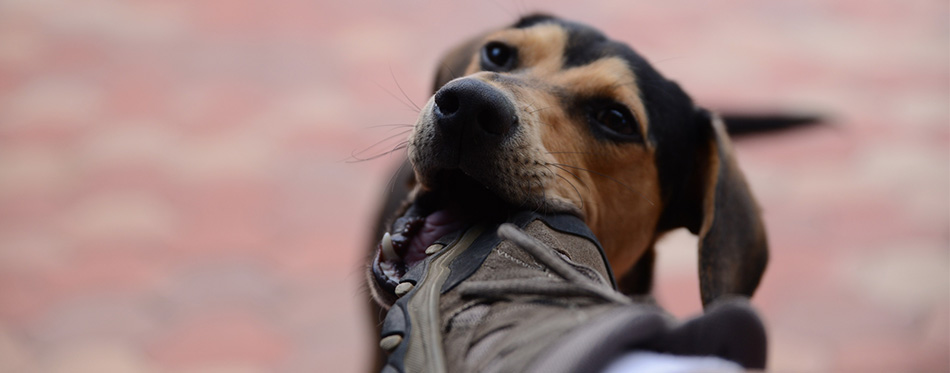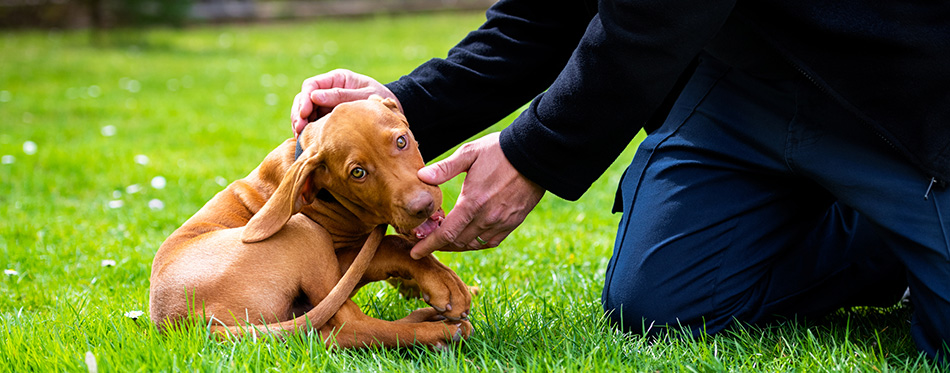Old habits die hard, especially when it comes to dogs who never learned how to stop biting as pups. Puppies who carry this habit with them all the way to adulthood are capable of injuring themselves and other people due to their stronger jaws and sharp teeth. Putting a stop to mouthing and nipping is not impossible but it does have its challenges, especially if you are dealing with a full grown dog who is much difficult to train and control. Sometimes, dog parents make the mistake of allowing their puppy to bite their arm instead of giving him a dog toy to chew or nibble on. If you are in the process of training your puppy or if you have a mouthing pooch on your hands, then the following tips can help you resolve this issue once and for all.

Aggression vs. Playfulness
Dogs express their excitement in many ways and mouthing happens to be one of them. This is considered normal behavior that stems from a place of happiness. In contrast, a dog who feels scared or anxious will have a completely different body language and this fear will translate into aggressive biting. Aggressive dogs will expose their teeth and will tense up in response to any threat. Moreover, an aggressive dog will bite quickly and without hesitation.
Related Post: Dog Whistles
How to Nip Biting in the Bud
Dogs love using all of their senses to explore the world around them and this includes chewing on items such as toys and furniture. It all starts during puppyhood when everything is new and exciting to the eyes of a young and innocent pooch who ends up using his mouth and teeth to feel the texture of peoples faces as well as their hands and feet. This innate curiosity drives him to chew on things he should not be chewing in the first place and this includes our body parts. Giving your puppy the green light to bite on your fingers and toes is a big mistake because he will continue to do so for years to come. Once your dog learns that biting people is okay, he will use his teeth to tug on limbs and other delicate body parts. Fortunately, it is never too late to help him control his mouthy behavior. The first thing you need to do is show him just how sensitive your skin is and train him to be gentle when using his mouth, especially during playtime. You may also like our article on anti chew spray for dogs.
Teach Your Dog the Value of Gentle Play
Dogs who bite have zero knowledge of just how painful their teeth can be, so your job is to use what is known as bite inhibition to teach your dog how to be gentle. As puppies, dogs usually get exposed to bite inhibition while playing with their siblings. Young pups take part in all kinds of games and they usually end up wrestling and biting one another. Sometimes, a very enthusiastic puppy can get carried away and clamp his jaw around another puppy with enough force to make him yelp in pain. When this happens, the enthusiastic pup usually pulls back in shock and both puppies pause their game for a few seconds. This moment alone can teach puppies that they need to control the force of their bite so no one gets hurts and they can continue playing and having fun. This simple lesson can be taught to mouthing dogs who are clueless about our sensitive skin.
The next time you play with your pooch, give him the freedom to bite your hands. Keep this up until he delivers a particularly hard bite to your skin and then use your fine acting skills to yelp in pain. Pretend that you are hurt and stop moving your hand. This action alone should surprise your pooch, effectively putting an end to his biting for the time being. You can follow up your loud cry with words of admonition such as ‘too bad’ , just remember to use a firm voice when you say them. If your pooch reacts by licking you or hitting the pause button on his biting, then you can praise him for doing so.
Continue playing with him, and if his hard biting makes a comeback, repeat the above steps and remember to cry out every single time. You are allowed to do this yelping trick three times within a fifteen minute timeframe. However, if this method does not end up working on its own, you can replace it with what it known as a time-out procedure. Adolescent and adult dogs usually benefit from this process since it helps control their biting habit. This method involves ignoring your pooch for a certain amount of time. For example, the next time he bites you hard, cry out and remove your hand when he pauses to stare at you. Afterwards, you can ignore him for 10 to 20 seconds. If his behavior persists, then you need to get up and move away for 10 to 20 seconds. Do not hesitate to exit the room if necessary. When this timeout period comes to an end, return to the room and resume playing with your pooch.
Learning the value of gentle play is very important because your dog will gradually realize that rough biting means no more fun and games with you, so continue playing with your pooch until he bites hard again. Repeat the above steps whenever he makes the same mistake until he finally reduces the force of his bite. If you want him to become more gentle, you can simply cry out in reaction to his moderately hard bites and repeat the same cycle of yelping and ignoring your pooch until he finally learns his lesson. You can teach your dog to become extremely gentle with you if you use this method on a regular basis.

Teach Your Dog How to Keep His Teeth to Himself
Next on the list is teaching your dog how to keep his teeth to himself and this means no more biting into skin. You can do this in a variety of ways and one of them involves giving your dog a chew bone or toy whenever he attempts to nibble on your fingers or toes.
- All dogs enjoy being stroked and scratched and those who are still stuck in the mouthing phase often bite in reaction to being petted. Treats can come in handy in this situation since you can use them to steer your pooch away from your precious skin. Simply hold a bunch of small dog treats in the palm of your hand and feed them to him during your petting session. This lesson teaches him to keep his jaws away from your hand whenever you touch him.
- Choose alternative ways to play with your pooch and make sure that you pick games will minimal physical contact such as fetch or hide and seek. You can also add tug-of-war to your list of games since it allows your pooch to practice good manners. Puppies might get overly excited during this game but you can easily manage the situation by stopping whenever Fido’s mouth touches your hand. Keep a tug toy on standby so you can use it as a distraction whenever your dog feels like mouthing. This will teach him to seek the toy instead of your hands the next time he gets riled up during playtime.
- Does your dog enjoy biting your feet and ankles? If the answer is yes, then you can use his most beloved tug toy to solve this problem. Stop moving your feet the second your pooch lunges at your legs and then pull out the tug toy and start waving it in the air to get his attention. Feel free to move your legs once he grabs hold of his favorite toy.
- Teaching him this lesson is also possible minus the toys, so if you do not have his tug toy on hand, you can simply freeze and wait for him to stop biting you. Reward him with praise the second he stops and fetch him his coveted toy from the house or yard. Repeat the previously mentioned steps until your pooch stops targeting your feet whenever he catches you moving them.
- Give your pooch his fair share of interactive and entertaining toys to play with and remember to stock up on safe chewable options. Having a wide array of items at his disposal will keep him busy and away from your skin and belongings.
- Playdates are also a great way for your dog to get his daily dose of exercise and socialize with friendly vaccinated dogs at the same time. Running around in the park and playing with his canine friends helps him burn off excess energy and most importantly, your pooch will have no desire to play roughly with you after a fun-filled afternoon with his playmates.
- The same timeout procedure mentioned above can be slightly altered so you can give your pooch a timeout every time his teeth come into contact with your skin. So, for example, whenever his teeth find their way to your hand, open your mouth and cry out in a high pitched voice and then proceed to walk away from him. Ignore him for 30 to 60 seconds and if he decides to follow you or if he simply resumes biting or nibbling on your arms, exit the room for 30 to 60 seconds. When timeout is over, simply return to the room and go back to interacting with your pooch in a calm manner.
- If all else fails, you can always buy a taste deterrent for dogs and use it to spray your body and clothes. Focus on areas that your pooch usually targets before playtime commences. If he immediately bites your moving calves, stop in your tracks and wait for his reaction to the bad taste of the repellant. Reward him with plenty of praise when he lets go of you. Make sure that you keep spraying the deterrent for at least two weeks. Fourteen days are more than capable of teaching your pooch not to come near your bitter tasting skin ever again.
- If none of the above solutions succeed, you can resort to the peppermint spray technique. However, keep in mind that this method should only be used as your last and most desperate attempt to stop your dog from mouthing you. Use your spearmint breath spray to squirt a very small amount into your dog’s mouth the second he starts biting you. Your pooch will hate the taste and sensation of the spray. Do not try this method if your pooch becomes aggressive or if he is scared of you.
If you find yourself unable to do this on your own, then seeking professional help in the form of a certified professional dog trainer is highly recommended. Professional trainers can offer you assistance and private classes where you can learn more about how to deal with your mouthing pooch.

What Not to Do
- Sometimes, our actions encourage our dogs to bite us without us even realizing it. For example, waving our toes and fingers in their faces in an attempt to get them to play with us can turn our hands into chew toys.
- Playtime is not just about helping your pooch stay healthy and making sure that he gets his fair share of exercise. Spending quality time with your dog helps you strengthen your bond. Teaching your puppy how to be gentle during playtime is also a plus. Failing to dedicate time to your pooch falls under the -things you should never do- umbrella.
- Refrain from yanking your feet or hands away from your dog when he bites you. Sudden movements can sometimes be misunderstood by your pooch, encouraging him to lunge forward in an effort to clamp his jaws around you.
- The more aggressive you are during playtime, the more riled up your dog will become. Punishing your dog will only exacerbate this unwanted behavior and will only succeed in instilling fear in him, so refrain from all forms of physical punishment including shaking his scruff and hitting him on the nose.
Source:
- How to Stop Puppy Biting – AKC

